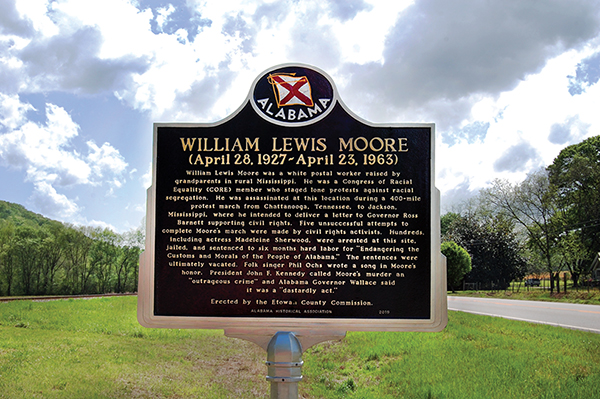By Madison Cannon, Staff Correspondent
This past Sunday (Apr. 14), a life was remembered for being ahead of his time and mourned for being forgotten for so many years.
The Keener Community along with the Keener Baptist Church held a ceremony for Mr. William L. Moore, a U.S. postman who made the decision to march from Chattanooga, Tenn. to Jackson, Miss., in order to deliver a letter to the Governor of Mississippi condemning segregation. Along that route, Moore was confronted by many pro-segregation citizens who voiced their opinion to him as he went.
Moore lost his life while walking that route and the letter he carried was never delivered. Moore was found about a mile away from Keener Baptist Church located on U.S. Hwy. 11, less than an hour after being interviewed by a Gadsden reporter. He had been shot in the head with a .22 caliber rifle and no charges were ever filed. The ballistics analysis matched a gun, owned by a store owner a couple miles from Moore’s place of death. When activists attempted to finish Moore’s march using the same route, they were met with Alabama State troopers and were beaten and arrested. Moore’s death sparked many marches throughout the South and ultimately led to the abolishment of segregation.
At Sunday’s special service – a little over a week after the 56th Anniversary of Moore’s death – Keener Baptist Church welcomed many people that long awaited justice for Moore’s death. Sadly, this dedication will be the closest we will come to closure for his wrongful death.
Jerry D. Smith, a local historian and one of the last people to see Moore before he died, welcomed attendees to the service and introduced Mike Marshall, an author who is currently writing a book titled No Place for Pilgrims in regard to Moore’s life and death. Smith, along with Marisa Cannon and Danny Crownover of the Etowah County Historical Society with support from the Etowah County Commission and the Southern Poverty Law Center, the Historical Marker Committee of the Alabama Historical Association, City of Gadsden Mayor Sherman Guyton and Alabama Tourism Board placed a historical marker where Moore’s body was found so many years ago.
Civil Rights Memorial Center Director Tafeni L. English was in attendance and spoke about how Moore’s death impacted the Civil Rights Movement. English said that she wanted to remember everybody that was involved in the Civil Rights Movement, not just leaders like Martin Luther King, Jr. and Rosa Parks.
“Millions of people were courageous in joining the struggle, often risking their lives in this process,” said English. “And as ugly as it may be, we must remember all of it, not some of it,”
Remembering William L. Moore is more than just remembering a man before his time; it is remembering someone who knew love was better than hate at his core and remembering a hero for risking his life for the equal treatment of everyone.





